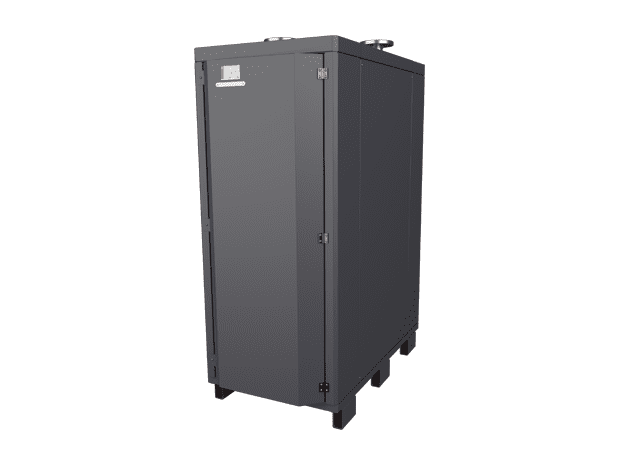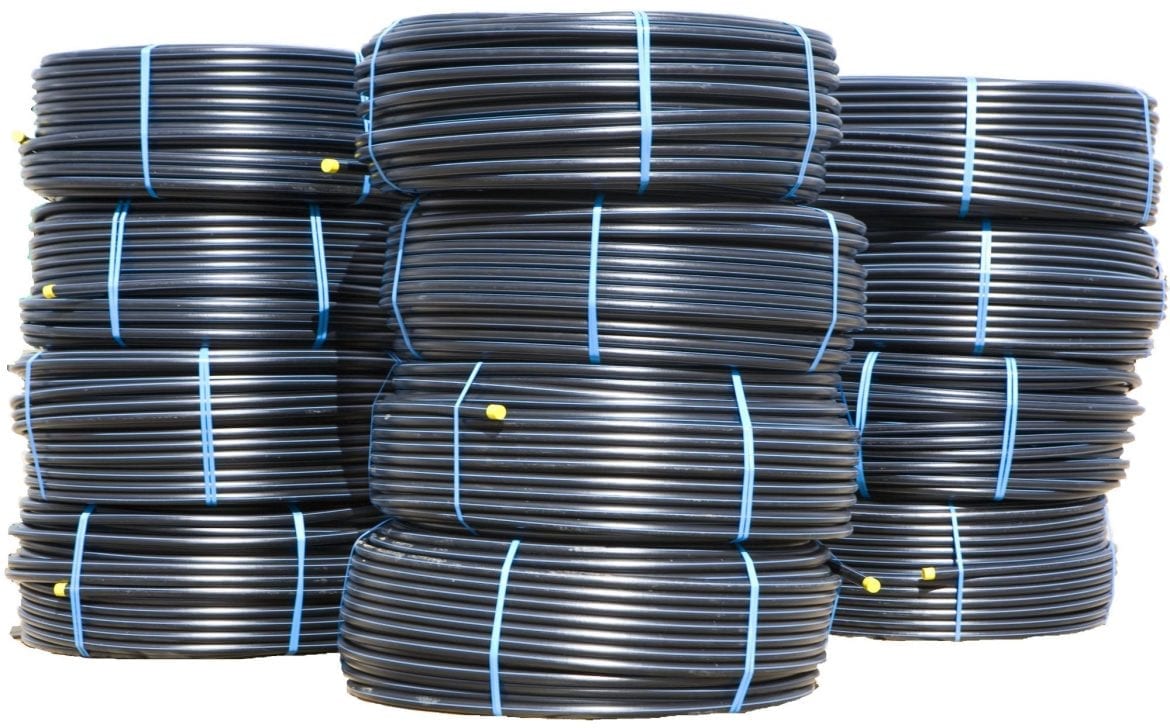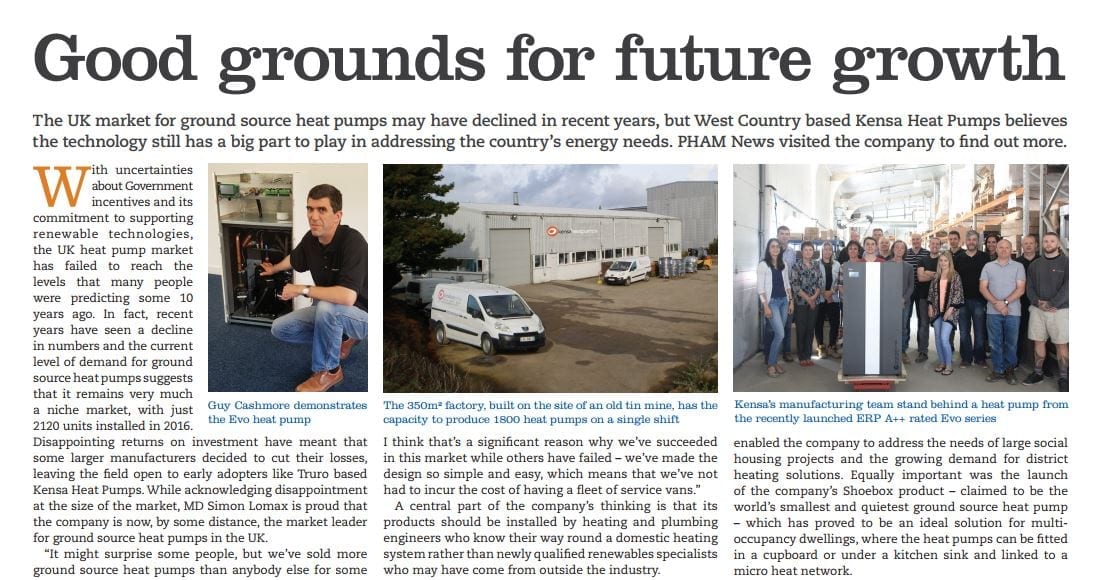The following article was published in PHAM News (September 2017)
The UK market for ground source heat pumps may have declined in recent years, but West Country based Kensa Heat Pumps believes the technology still has a big part to play in addressing the country’s energy needs. PHAM News visited the company to find out more.
With uncertainties about Government incentives and its commitment to supporting renewable technologies, the UK heat pump market has failed to reach the levels that many people were predicting some 10 years ago. In fact, recent years have seen a decline in numbers and the current level of demand for ground source heat pumps suggests that it remains very much a niche market, with just 2120 units installed in 2016. Disappointing returns on investment have meant that some larger manufacturers decided to cut their losses, leaving the field open to early adopters like Truro based Kensa Heat Pumps. While acknowledging disappointment at the size of the market, MD Simon Lomax is proud that the company is now, by some distance, the market leader for ground source heat pumps in the UK.
It might surprise some people, but we’ve sold more ground source heat pumps than anybody else for some time now.
Some global or pan-European companies have walked away from the UK market because they simply decided that it’s too tough. So we’ve benefited from their absence and filled the void.
Keeping it simple
Kensa was founded in 1999 by two former marine engineers – Richard Freeborn and Guy Cashmore – who, having spent a number of years working on heat pump installations for luxury yachts in the Mediterranean, recognised the opportunity to transfer the technology to applications closer to home. From early on, they also recognised that the key to success was to come up with a simplified and less costly alternative to what they considered to be often over-designed and unnecessarily complicated imported products.
Guy, who is now the company’s Technical Director, explains:
The original idea, and it still runs through the business today, is that a Kensa heat pump would be transported as a kit to anywhere in the country, and then a plumbing or heating engineer – who had probably never seen such a product before – would be able to get it installed, working, and fully commissioned, with only phone support. It’s not necessary for a Kensa engineer to go anywhere near it during the installation process. Of course they are available if needed, but we kind of feel if they have to go out to a job, we’ve got something wrong. I think that’s a significant reason why we’ve succeeded in this market while others have failed – we’ve made the design so simple and easy, which means that we’ve not had to incur the cost of having a fleet of service vans.
A central part of the company’s thinking is that its products should be installed by heating and plumbing engineers who know their way round a domestic heating system rather than newly qualified renewables specialists who may have come from outside the industry. Simon says:
We try to mimic the technology that installers are familiar with. It’s still a box that produces hot water, and what you do with that hot water can essentially follow the same paths as if you had a gas or oil boiler in place. Obviously we give them lots of support in the areas where they have no knowledge – the size of the ground array and what you might have to do with the heat distribution system – but the actual work they do using the tools is going to be straightforward and familiar work for them.
Homemade
Designing and manufacturing products in the UK for installation by British plumbers in British homes perhaps gives the company an edge over some of its competitors, but another key factor is the relatively modest size of the business which has enabled it to adapt quickly to shifts in the market. Guy explains:
If we made a plan 10 years ago and stuck to it we probably wouldn’t be here today.
So we have to be resourceful. One of the benefits of being a small company is that we can be more flexible than some of our bigger competitors.
The development of a contracting side to the Kensa business was not part of the original plans, but it has enabled the company to address the needs of large social housing projects and the growing demand for district heating solutions. Equally important was the launch of the company’s Shoebox product – claimed to be the world’s smallest ground source heat pump – which has proved to be an ideal solution for multi-occupancy dwellings, where the heat pumps can be fitted in a cupboard or under a kitchen sink and linked to a micro heat network.
Although Kensa can lay claim to having been involved in a number of prestigious projects over the years, and can count the RNLI as one of its regular clients, its the prospect of being able to reduce energy bills for those people who need it most that presents the strongest case for the wider adoption of ground source technology. Simon continues:
We’ve got plenty of evidence now that these things really work and do save money. It’s not about putting a fancy bit of kit into a big house – there’s a social purpose to this business. I get most satisfaction when we get letters from social landlords, or their tenants, which say that you actually told us it would save this much, but it’s saved even more. If you have an elderly resident in a two bed bungalow, previously paying a thousand pounds a year for night storage heaters, and we’ve suddenly knocked that down to £500, well it actually transforms their lives. In many cases they’re actually heating more of the property for longer and still saving money.
Looking up
It’s such real life case studies that give Kensa confidence that the prospects for the UK ground source heat pump market remain positive and such technology should play a central part in the Government’s carbon reduction plans. Simon comments:
We are dependent on government decisions and it’s hard to get away from that. They need to be involved because our technology is more expensive than the alternatives, but it’s also the most energy efficient option available.
Despite the ongoing challenges, Simon is proud of what the company has achieved so far and relishes the prospect of continuing to beat the odds.
There is a perception that engineering businesses don’t reside in this part of the world, so we’ve had to fight that a little bit, but for us it’s all part of this underdog story – a small company in deepest Cornwall battling against the pan-European giants – and winning! That’s the message I’m always telling to staff – never forget how good we are – the market numbers are telling us we’re number one.







